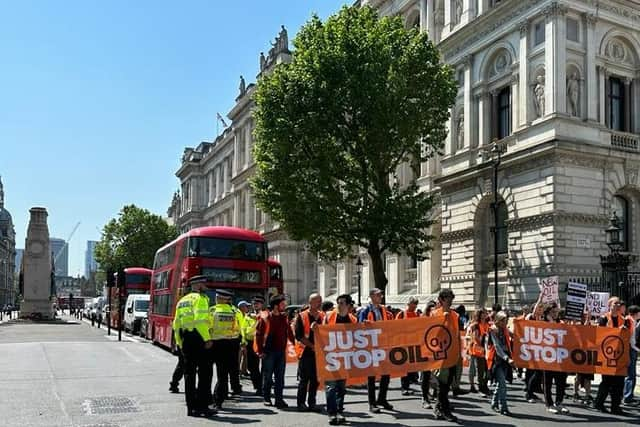Public Order Act: Government facing legal action over move to restrict some protests
and live on Freeview channel 276
The campaign group Liberty says it plans to bring legal action against the government for the way it introduced regulations making it easier for police to stop protests judged to be ‘disruptive’.
MPs approved the measures on Monday (12 June) but they were described as a “constitutional outrage” in the House of Lords. Liberty accused Home Secretary Suella Braverman of “sneaking in new legislation via the back door” - something denied by ministers.
What will these regulations do?
Advertisement
Hide AdAdvertisement
Hide AdAfter a string of demonstrations in recent months by groups including Just Stop Oil and Insulate Britain, which have included slow marches along public roads, the government wanted to lower the threshold for what’s considered ‘serious disruption’ to community life from ‘significant’ and ‘prolonged’ to ‘more than minor’.
Braverman said this would give police officers more clarity on when they could take action against ‘harmful’ protests. She said: “People have a right to get to work on time free from obstruction, a right to enjoy sporting events without interruption and a right to get to hospital”.


“The roads belong to the British people, not a selfish minority who treat them like their personal property. The impact of these disruptors is huge. Over the last six weeks alone Just Stop Oil carried out 156 slow marches around London”.
Opposition parties raised serious concerns about the changes. Shadow Home Secretary Yvette Cooper said they would give police “the power to prevent any and every campaign group protesting outside a local library or swimming pool that is about to be closed because it may be a little more than minor”. The SNP’s Alison Thewliss also accused the government of slow walking the country into “fascism”.
What happened in Parliament?
Advertisement
Hide AdAdvertisement
Hide AdThe House of Lords had already rejected the measures - which formed part of the controversial Public Order Bill - earlier this year.
But Braverman brought them back as so-called “secondary legislation” - which faces less scrutiny and consultation. While MPs voted by 277 to 217 to approve the changes on Monday, peers last night (13 June) supported what’s known as a “regret motion” - criticising the way the government had got them through Parliament.
Labour’s Lord Coaker said: “It is an absolute fundamental constitutional outrage. Primary legislation was defeated. So what does the government do? It doesn’t bring forward new primary legislation, it tries to sneak through, in an underhand way, secondary legislation without proper public consultation”.
“They undermine the workings of our parliamentary democracy and, as such, it is shocking”.
Advertisement
Hide AdAdvertisement
Hide AdIndependent crossbencher Lord Lisvane added: “The Home Office has behaved in a way which I think I can find no kinder word to use than disreputable”.
Nevertheless, the measures are now law and come into effect at midnight tonight.
What is Liberty doing?
Liberty has now written to Braverman, warning her it plans to ask for judicial review of her actions.
In a statement, the campaign group said she’d “now changed the law entirely in a way that is an overreach of her power”. It added that the “new legislation was not consulted on fairly, as is required by law” - with the Home Office failing to ask “groups who might have had reasonable concerns”.
How has the government responded?
Advertisement
Hide AdAdvertisement
Hide AdThe Home Office is yet to set out its formal response to the letter but speaking in the Lords last night, Home Office minister Lord Sharpe of Epsom said: “I am obviously going to refute the allegation that this is in someway unconstitutional or indeed an outrage”.
“The sequencing of debates and votes during the passage of the Public Order Act 2023 meant the House of Commons were unable to consider the measures. Now the elected House has approved the measures we must respect their will and do the same”.
Comment Guidelines
National World encourages reader discussion on our stories. User feedback, insights and back-and-forth exchanges add a rich layer of context to reporting. Please review our Community Guidelines before commenting.
